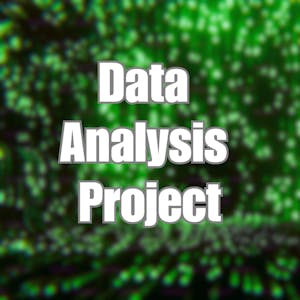Data Analysis with Python Project
About this Course
The \"Data Analysis Project\" course empowers students to apply their knowledge and skills gained in this specialization to conduct a real-life data analysis project of their interest. Participants will explore various directions in data analysis, including supervised and unsupervised learning, regression, clustering, dimension reduction, association rules, and outlier detection. Throughout the modules, students will learn essential data analysis techniques and methodologies and embark on a journey from raw data to knowledge and intelligence. By completing the course, students will be proficient in data analysis, capable of applying their expertise in diverse projects and making data-driven decisions. By the end of this course, students will be able to: 1. Understand the fundamental concepts and methodologies of data analysis in diverse directions, including supervised and unsupervised learning, regression, clustering, dimension reduction, association rules, and outlier detection. 2. Define the scope and direction of a data analysis project, identifying appropriate techniques and methodologies for achieving project objectives. 3. Apply various classification algorithms, such as Nearest Neighbors, Decision Trees, SVM, Naive Bayes, and Logistic Regression, for predictive modeling tasks. 4. Implement cross-validation and ensemble techniques to enhance the performance and generalizability of classification models. 5. Apply regression algorithms, including Simple Linear, Polynomial Linear, and Linear with regularization, to model and predict numerical outcomes. 6. Perform multivariate regression and apply cross-validation and ensemble methods in regression analysis. 7. Explore clustering techniques, including partitioning, hierarchical, density-based, and grid-based methods, to discover underlying patterns and structures in data. 8. Apply Principal Component Analysis (PCA) for dimension reduction to simplify high-dimensional data and aid in data visualization. 9. Utilize Apriori and FPGrowth algorithms to mine association rules and discover interesting item associations within transactional data. 10. Apply outlier detection methods, including Zscore, IQR, OneClassSVM, Isolation Forest, DBSCAN, and LOF, to identify anomalous data points and contextual outliers. Throughout the course, students will actively engage in tutorials, practical exercises, and the data analysis project case study, gaining hands-on experience in diverse data analysis techniques. By achieving the learning objectives, participants will be well-equipped to excel in data analysis projects and make data-driven decisions in real-world scenarios.Created by: University of Colorado Boulder

Related Online Courses
In this 1-hour long project-based course, you will learn how to Access an EC2 instance shell from the AWS console Amazon Elastic Compute Cloud is the service you use to create and run virtual... more
This course is primarily about business negotiation and building confidence in your ability to negotiate effectively. But these skills can be applied in life too. The course presents the tools,... more
In diesem Kurs erfahren Sie, wie Sie mithilfe von Deep Learning ein Modell zur Bilduntertitelung erstellen. Sie lernen die verschiedenen Komponenten eines solchen Modells wie den Encoder und... more
Welcome! In this course learners will develop expertise in basic magnetic resonance imaging (MRI) physics and principles and gain knowledge of many different data acquisition strategies in MRI. In... more
This specialized program is aimed at computer people who want to enter the field of information systems and learn their different types of requirements, architectures, performance, techniques and... more








